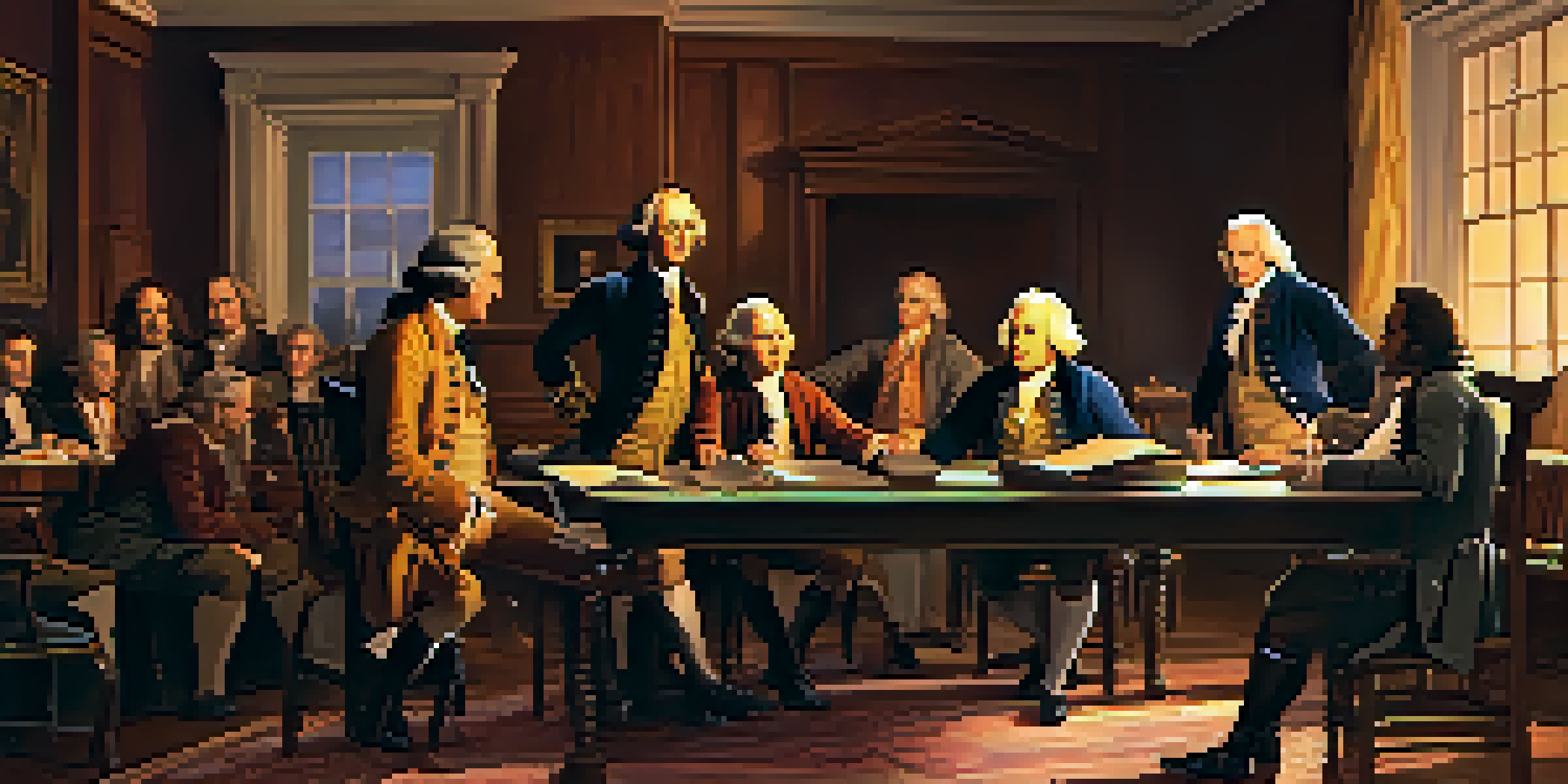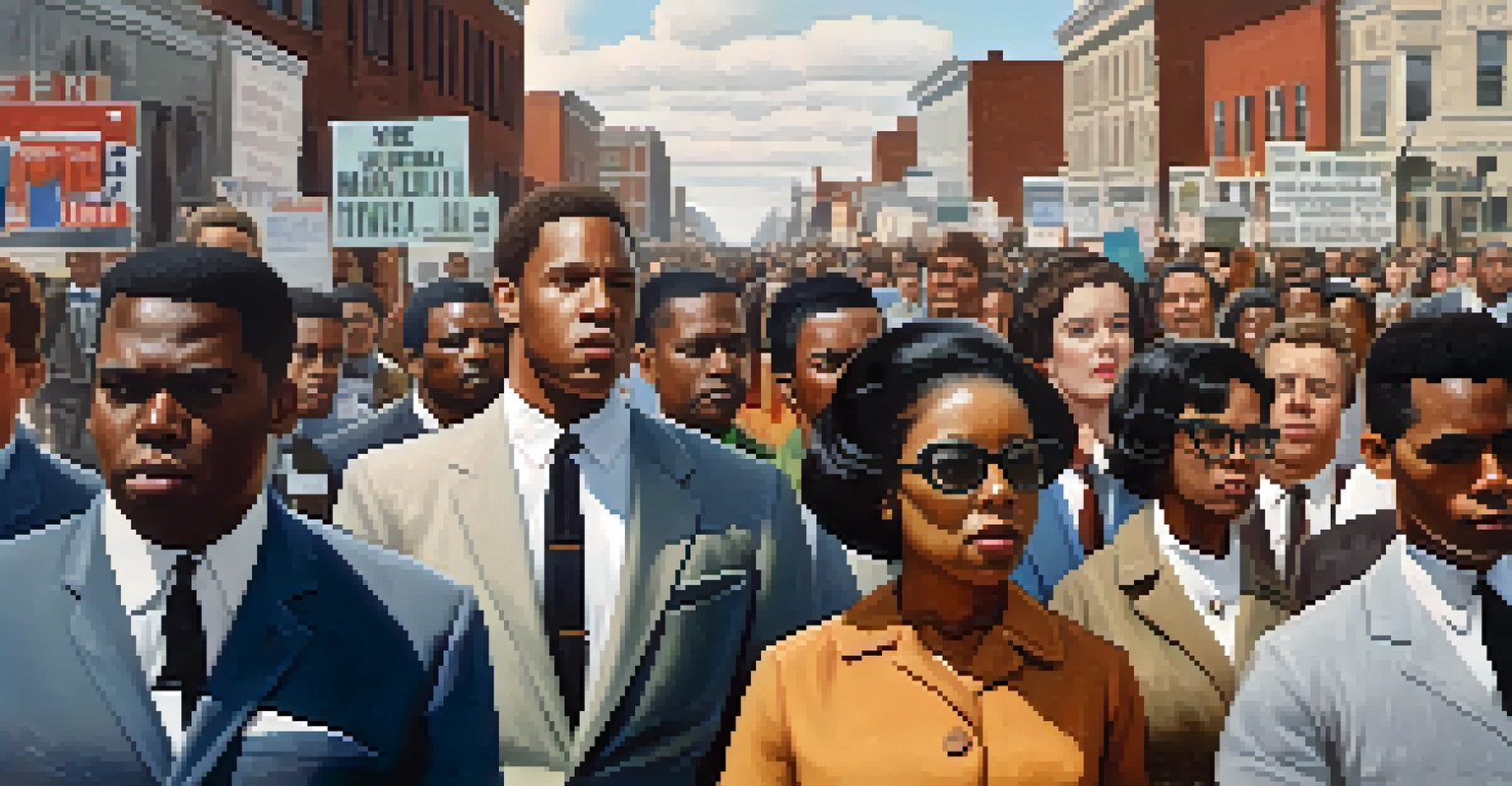Major Historical Events Shaping Washington's Political Landscape

The Founding Fathers and the Birth of a Nation
The foundation of the United States in the late 18th century marked a profound shift in governance. The Declaration of Independence in 1776, followed by the Constitution in 1787, established principles that guided American politics. These documents were the result of intense debates among the Founding Fathers, who envisioned a new form of government that balanced power among branches.
The only thing we have to fear is fear itself.
The Federalist Papers, penned by Hamilton, Madison, and Jay, played a crucial role in convincing the public to support the Constitution. Their arguments not only defended the new framework but also laid the groundwork for the political discourse that would follow. This period was instrumental in shaping the ideals of democracy, liberty, and justice that continue to resonate today.
Moreover, the ideals set forth during this era have had a lasting impact on Washington's political landscape. They sparked discussions that would lead to the formation of political parties, a significant evolution in American politics. The legacy of the Founding Fathers is still evident in the ongoing debates about federalism and states' rights.
The Civil War: A Nation Divided
The Civil War (1861-1865) was a pivotal moment that tested the very fabric of the United States. Rooted in deep-seated issues like slavery and states' rights, the conflict led to a significant shift in political power. The war ultimately resulted in the preservation of the Union and the abolition of slavery, reshaping the political landscape of Washington.

In the aftermath of the war, the Reconstruction era sought to address the rights of newly freed slaves and reintegrate Southern states. This period was marked by fierce political struggles, as various factions fought over how best to rebuild the nation. The passing of the 13th, 14th, and 15th Amendments aimed to establish equality, though their implementation faced significant resistance.
Founding Ideals Shape Democracy
The Founding Fathers established principles of democracy and governance that continue to influence American politics today.
The Civil War's legacy continues to influence political discussions, especially regarding civil rights and social justice. The ongoing struggle for equality highlights the complexities of American democracy. Today, debates about systemic inequality can be traced back to the unresolved issues that emerged during this turbulent time.
The New Deal: Government's Role Redefined
In response to the Great Depression, President Franklin D. Roosevelt introduced the New Deal in the 1930s. This series of programs and reforms aimed to provide relief, recovery, and reform to a struggling nation. The expanded role of the federal government during this time marked a significant shift in how Americans viewed political responsibility.
Injustice anywhere is a threat to justice everywhere.
Through initiatives like Social Security and unemployment insurance, the New Deal established safety nets that continue to be vital today. The government's increased involvement in the economy changed the relationship between citizens and their government, fostering expectations for federal support during crises. This shift laid the foundation for modern welfare policies.
Ultimately, the New Deal solidified the idea that the government has a role in ensuring economic stability and protecting citizens' welfare. This change has fueled ongoing debates about the extent of government intervention in the economy. The impact of the New Deal remains a touchstone in discussions about social policy and economic reform.
The Civil Rights Movement: A Fight for Equality
The Civil Rights Movement of the 1950s and 1960s was a transformative period that sought to end racial discrimination and secure equal rights for African Americans. Key figures, such as Martin Luther King Jr. and Rosa Parks, galvanized public opinion and pushed for legislative changes. Their efforts culminated in landmark legislation, including the Civil Rights Act of 1964 and the Voting Rights Act of 1965.
These laws not only dismantled institutionalized segregation but also reshaped the political landscape by increasing voter registration and participation among marginalized communities. The movement highlighted the power of grassroots activism and civil disobedience in effecting change. It also inspired other social movements, creating a ripple effect that continues to influence political discourse.
Civil Rights Movement's Legacy
The Civil Rights Movement not only dismantled segregation but also inspired ongoing efforts for equality and justice in America.
The legacy of the Civil Rights Movement is evident in today's continued fight for equality and justice. The principles of nonviolent protest and collective action resonate in modern social movements, reminding us of the ongoing struggle for civil rights. The political landscape in Washington remains deeply influenced by the ideals and achievements of this era.
Watergate: Trust in Government Shattered
The Watergate scandal in the early 1970s marked a significant turning point in American politics. What began as a break-in at the Democratic National Committee headquarters escalated into a constitutional crisis, leading to President Nixon's resignation in 1974. The scandal exposed the extent of governmental corruption and abuse of power, leading to widespread disillusionment among the public.
In the wake of Watergate, trust in government significantly eroded, prompting calls for increased transparency and accountability. This movement was instrumental in enacting reforms, such as the Freedom of Information Act and campaign finance laws, aimed at restoring public confidence. The scandal reshaped the relationship between the government and its citizens, emphasizing the need for checks and balances.
Watergate's impact continues to be felt today, as discussions about ethics, governance, and accountability remain at the forefront of political discourse. The scandal serves as a reminder of the importance of vigilance in protecting democratic institutions. In an era of political polarization, the lessons learned from Watergate are more relevant than ever.
9/11 and the Rise of National Security Politics
The September 11 attacks in 2001 profoundly changed the political landscape of the United States. The tragic events led to a reevaluation of national security priorities, resulting in the implementation of the USA PATRIOT Act and the establishment of the Department of Homeland Security. These measures reflected a shift towards a more security-focused government approach.
The aftermath of 9/11 also saw the U.S. engage in prolonged military conflicts in Afghanistan and Iraq, raising questions about foreign policy and military intervention. This era marked a significant shift in how America viewed its role in global affairs, as the focus on terrorism reshaped both domestic and international policies. The political discourse became heavily influenced by issues of security, surveillance, and civil liberties.
Social Media Transforms Politics
The rise of social media has revolutionized political communication, enabling greater public engagement while also complicating the landscape with misinformation.
Today, the legacy of 9/11 continues to affect political discussions, particularly in relation to immigration and national security. The balance between protecting civil liberties and ensuring safety remains a contentious debate. As new threats emerge, the political landscape will likely continue to evolve in response to these challenges.
The Rise of Social Media: New Political Dynamics
In the 21st century, the rise of social media has revolutionized how politics is communicated and engaged with. Platforms like Twitter, Facebook, and Instagram have become essential tools for political campaigns and grassroots movements alike. This shift has democratized the flow of information, allowing voices that were previously marginalized to gain prominence.
Social media has enabled real-time communication, allowing politicians to connect directly with constituents and bypass traditional media filters. However, it has also led to the spread of misinformation and polarization, complicating the political landscape. The ability for information to go viral can mobilize support or create divisive narratives, challenging the way political discourse unfolds.

As social media continues to shape political engagement, its impact on Washington's political landscape grows. The influence of digital platforms on elections, policy discussions, and public opinion is undeniable. Navigating this new terrain presents both opportunities and challenges for politicians and citizens alike, as they adapt to the changing dynamics of political communication.